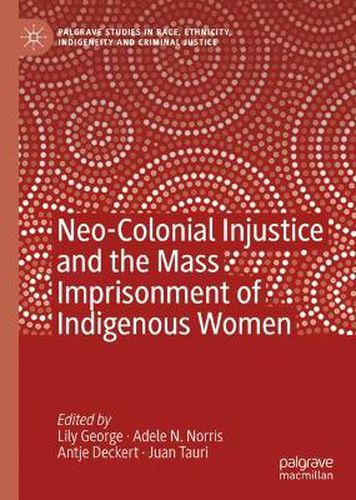Readings Newsletter
Become a Readings Member to make your shopping experience even easier.
Sign in or sign up for free!
You’re not far away from qualifying for FREE standard shipping within Australia
You’ve qualified for FREE standard shipping within Australia
The cart is loading…






This title is printed to order. This book may have been self-published. If so, we cannot guarantee the quality of the content. In the main most books will have gone through the editing process however some may not. We therefore suggest that you be aware of this before ordering this book. If in doubt check either the author or publisher’s details as we are unable to accept any returns unless they are faulty. Please contact us if you have any questions.
This book closes a gap in decolonizing intersectional and comparative research by addressing issues around the mass incarceration of Indigenous women in the US, Australia, Canada, and Aotearoa New Zealand. This edited collection seeks to add to the criminological discourse by increasing public awareness of the social problem of disproportionate incarceration rates. It illuminates how settler-colonial societies continue to deny many Indigenous peoples the life relatively free from state interference which most citizens enjoy. The authors explore how White-settler supremacy is exercised and preserved through neo-colonial institutions, policies and laws leading to failures in social and criminal justice reform and the impact of women’s incarceration on their children, partners, families, and communities. It also explores the tools of activism and resistance that Indigenous peoples use to resist neo-colonial marginalisation tactics to decolonise their lives and communities. With most contributors embedded in their indigenous communities, this collection is written from academic as well as community and experiential perspectives. It will be a comprehensive resource for academics and students of criminology, sociology, Indigenous studies, women and gender studies and related academic disciplines, as well as non-academic audiences: offering new knowledge and insider insights both nationally and internationally.
$9.00 standard shipping within Australia
FREE standard shipping within Australia for orders over $100.00
Express & International shipping calculated at checkout
This title is printed to order. This book may have been self-published. If so, we cannot guarantee the quality of the content. In the main most books will have gone through the editing process however some may not. We therefore suggest that you be aware of this before ordering this book. If in doubt check either the author or publisher’s details as we are unable to accept any returns unless they are faulty. Please contact us if you have any questions.
This book closes a gap in decolonizing intersectional and comparative research by addressing issues around the mass incarceration of Indigenous women in the US, Australia, Canada, and Aotearoa New Zealand. This edited collection seeks to add to the criminological discourse by increasing public awareness of the social problem of disproportionate incarceration rates. It illuminates how settler-colonial societies continue to deny many Indigenous peoples the life relatively free from state interference which most citizens enjoy. The authors explore how White-settler supremacy is exercised and preserved through neo-colonial institutions, policies and laws leading to failures in social and criminal justice reform and the impact of women’s incarceration on their children, partners, families, and communities. It also explores the tools of activism and resistance that Indigenous peoples use to resist neo-colonial marginalisation tactics to decolonise their lives and communities. With most contributors embedded in their indigenous communities, this collection is written from academic as well as community and experiential perspectives. It will be a comprehensive resource for academics and students of criminology, sociology, Indigenous studies, women and gender studies and related academic disciplines, as well as non-academic audiences: offering new knowledge and insider insights both nationally and internationally.